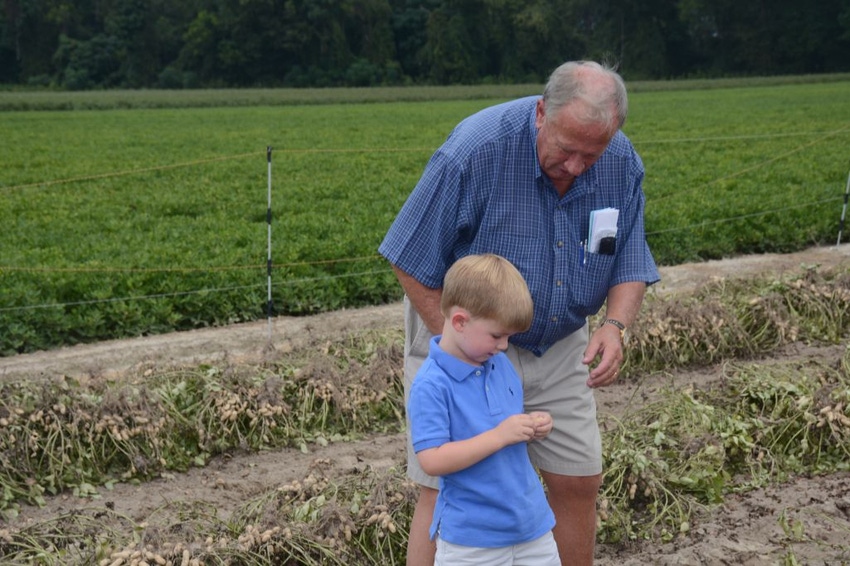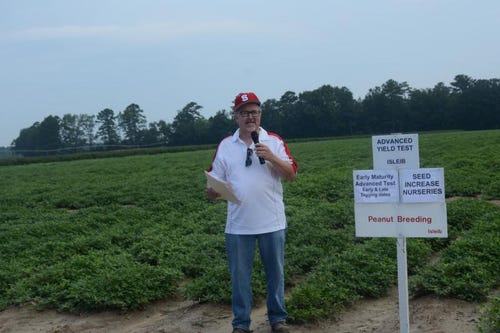
Bailey has become a superstar Virginia-type peanut due to its high yield and disease resistance. But with the industry calling for high-oleic peanuts, farmers in the Carolinas and Virginia are turning to cultivars with high-oleic chemistry.
Tom Isleib, the peanut breeder at N.C. State who developed Bailey, says there should be plenty of seed available next year for farmers to plant Sullivan and Wynne, two new high-oleic cultivars released by N.C. State that offer similar yield potential and disease resistance as Bailey, which is not high oleic.
During a Peanut Variety Quality and Evaluation field tour Sept. 7 at the Taylor Slade Farm in Williamston, N.C., Sullivan, Wynne as well as a number of high-oleic experimental lines were highlighted. “There are currently 25 lines in the PVQE program, including seven high oleic Bailey derivatives,” Isleib said.
The PVQE program is the official regional variety test for peanuts in the Virginia-Carolina region with sites in Virginia, North Carolina and South Carolina. “The PVQE trials are the last stage in our testing program. These are the most advanced lines. Data from this program is high quality data,” Isleib said.
The PVQE program is managed by Maria Balota with Virginia Tech’s Tidewater Agricultural Research and Extension Center in Suffolk. Scientists from Clemson University Edisto Research and Education Center in Blackville, SC, are involved as well as researchers from N.C. State.
Isleib says N.C. State’s peanut breeding program is hierarchical in nature. Before they reach a PVQE plot, a preliminary test of new lines is conducted in a single year. Ten to 20 percent of those lines move to N.C. State’s advanced yield test series where there are replicated trials in three sites across North Carolina.
“After at least two years in the AYT series, a line may ‘graduate’ to the PVQE program,” Isleib said. “After a minimum of three years in the PVQE program, a line may be considered for release as a cultivar.”
Due to the success Bailey and the demand for the processing industry for the high oleic trait, Isleib and his team backcrossed the gene containing the high-oleic trait into Bailey. Seven high-oleic backcross derivatives of Bailey are now in the PVQE program.
“We have had them in testing in state for four years (a fifth in 2016). Their yields and grades have been competitive with or better than Bailey’s. We are also monitoring their disease reactions and flavor profiles. Our intention is to release the best one, replacing the very popular Bailey cultivar with a high-oleic version,” he said.
Taylor Slade, who has had a PVQE trail on his family’s farm since 1971, also noted the good data that comes out of the PVQE program. “It’s always refreshing to see what Tom has coming out,” Slade said.
“Baileys have moved the peanut program in the VC (Virginia-Carolina) area a long way. Bailey is a good variety. We are looking forward to Sullivan. We are looking forward to any new varieties that, as they come, give us the strength we have learned to expect out of Bailey in both good years and bad years.”
“This is our future right out there in that field,” Slade said at the PVQE plot on his farm. “We husband them, we do the best we can with the cards we’ve been dealt and we move forward. We’ve gotten some great varieties out of this test plot and we look forward to Tom’s new varieties.”

North Carolina State University Peanut Breeder Tom Isleib, shown speaking at the Peanut Field Day in Lewiston-Woodville the day after the PVQE Field Tour, says peanut lines in the PVQE trials are the most advanced lines and data from this program is high quality data.
About the Author(s)
You May Also Like






